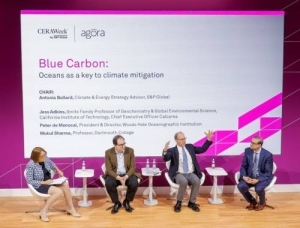
- About
- Education
- Research
- Thought Leadership
- Engagement
- News & Events
Back to Top Nav
Back to Top Nav
Back to Top Nav
Back to Top Nav
Back to Top Nav
On March 11, 2025, Dartmouth's Professor Mukul Sharma participated in the session "Blue Carbon: Oceans as a Key to Climate Mitigation" during CERAWeek's Innovation Agora, with notable experts in ocean science and climate strategy. The discussion was led by Antonia Bullard, with insights from Peter de Menocal, President of the Woods Hole Oceanographic Institution; and Jess Adkins, a Professor at Caltech and Co-founder of Calcarea. Together, the three speakers highlighted the ocean's pivotal role in addressing climate change, particularly through carbon sequestration and innovative solutions to reduce atmospheric carbon dioxide (CO2) levels.
Jess Adkins opened the conversation with an overview of ocean acidification and the challenges posed by pollution and warming waters, which complicate the ocean's natural ability to buffer CO2. He introduced Calcarea's ambition to decarbonize the shipping industry through methods that leverage natural processes, such as capturing CO2 and storing it using limestone in a technique called accelerated weathering. Mukul Sharma further elaborated on the marine biological pump's capacity to sequester carbon, revealing experiments that show how dust could aid in the recruitment of marine life to facilitate carbon capture. This innovative prospect could potentially evolve into large-scale natural solutions for CO2 removal.

Peter de Menocal emphasized the urgency of scalable and efficient ocean-based carbon removal strategies, stressing the need for collaboration between science and the private sector. He noted that any success in mitigating climate change through these methods must be grounded in robust monitoring and verification frameworks. This point resonated with the need for an "Ocean Vital Signs Network" to measure carbon flows and ensure accountability, ultimately paving the way for an effective market in ocean-derived carbon credits.
The session concluded with discussions on the broader implications of geoengineering and the necessity for a unified regulatory approach to promote ocean-based solutions. As the planet grapples with rising greenhouse gas emissions primarily from fossil fuels, the experts agreed that integrating natural ocean processes into climate strategies can offer promising pathways. By recruiting the marine biological pump and leveraging innovative technologies, there is hope for effectively reducing CO2 concentrations and mitigating the impacts of climate change in the long term.
CERAWeek is regarded as one of the most influential annual conferences in the energy sector, drawing nearly 10,000 executives, policymakers, investors, entrepreneurs, and scientists from around the globe. Attendees engaged in a week filled with hundreds of discussions, covering topics such as domestic energy production, the influence of AI on energy systems, the rapid deployment of solar energy, the evolving policy landscape, and pioneering carbon capture technologies.
The Irving Institute brought 25 delegates who actively networked with industry leaders and exchanged ideas. Our faculty, staff, and affiliated startups delivered over two dozen presentations throughout the week.